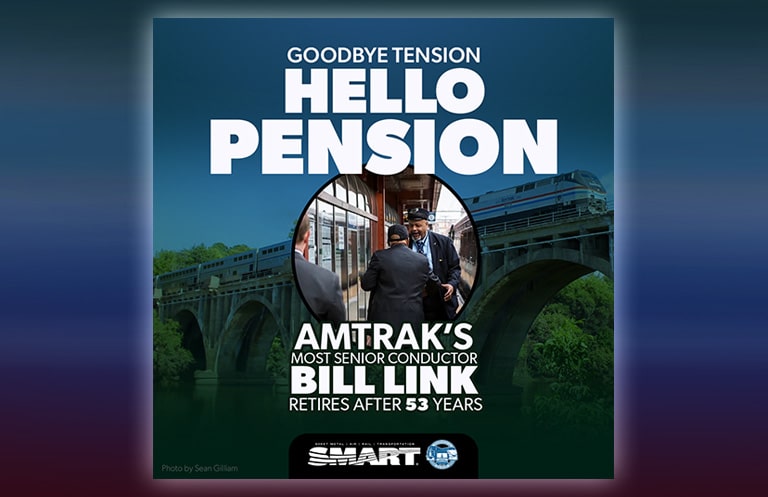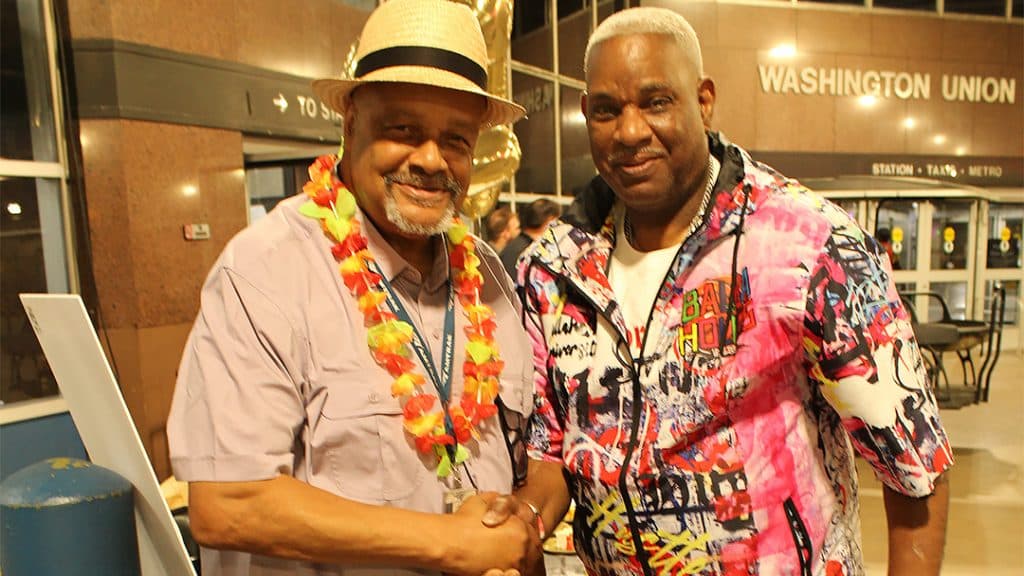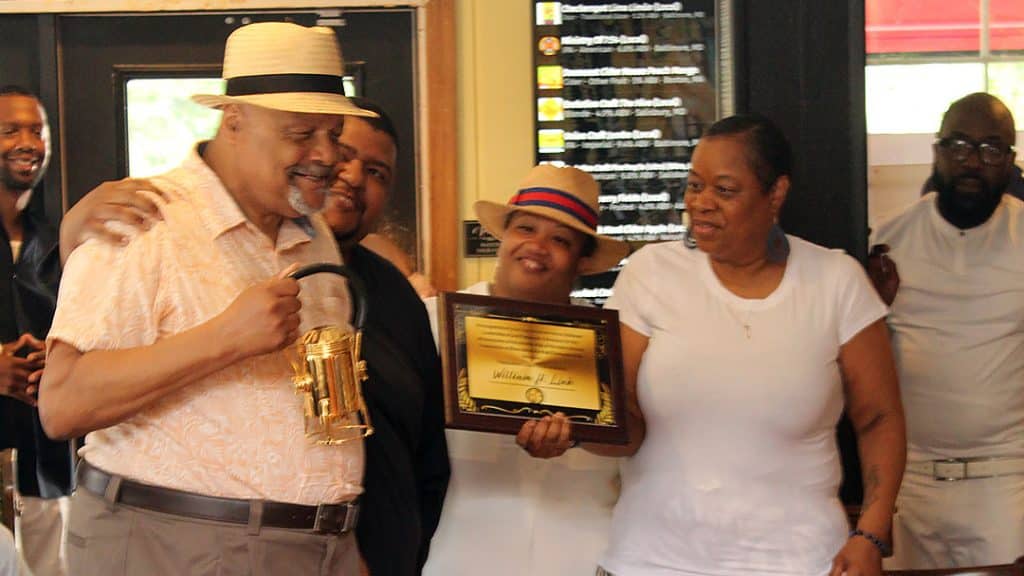
June 27 is an important day for Brother Bill Link.
In 1972, it was the day that he began his railroad career. In 2025, it was the day that he officially retired after 53 years of service, the highest Amtrak seniority in the country.
“I loved it. It’s like riding on a rolling treasurer chest, if you’re conscious,” reflected Brother Link in an interview with SMART News two weeks into his retirement. “I found out it was the perfect job for me.”
An Abrupt End to Post-Graduation Limbo
After graduating from Lincoln University in the early 1970s, Brother Link wasn’t in a hurry to find a job.
Instead, he was hanging out at the bar with his friends before heading home between three and four o’clock in the morning, just “living life after college.”
Then one morning he woke up to his 6’3”, 300-pound truck-driver father standing over him. He told him “Boy, if you think you’re gonna be sleeping in my house when I’m going to work after I put you through college, you got another thing coming.”
The next thing Brother Link knew, he was at a job fair in New York City.
“I said ‘Hell no, I don’t want to county money in a room all my life’ so I went up to Central Park and hung out for an hour or two.”
While he was there, he thought about a suggestion from a neighbor back home about the railroad looking for new hires.
Too Tall to be an Engineer
He vividly remembers taking a test with about 11 other men before being told that he was picked for the premier engineer job but was too tall.
As an African American during the height of the Black Power Movement, Brother Link figured that “reasoning” had something to do with his skin color. But it wasn’t that or physical stature that made him too tall. It was his hair.
He waited in a room for about 20 minutes before someone came in and told him “Mr. Link, if you want a job, come back in one hour without that” and pointed to his afro.
“That was the day the revolution died,” said Brother Link, laughing.

Starting a New Chapter
The day the revolution died was also the birth of Brother Link’s more than five-decades on the rails.
“I was working on freight trains, coal trains, whatever. So I had a mixed career,” he explained. “It wasn’t always on the passenger train, but by the time I got older I got on the passenger train.”
That’s where Brother Link had some of his most impactful experiences.
“The conductor had a lot of roles to play,” he said. “He’s a priest, he’s a policeman, he’s an entertainer. When the train is late, he’s got to keep the people informed and occupied, things like that.”
His last passenger that he talked to before retirement was especially memorable.
“[It] was [singer] Dionne Warwick. She rode the first-class car, and I told her my story about how I’m getting ready to retire.”
The connection that she shares with the railroad is even more memorable: her father was a Pullman Car Porter.
“Can you imagine that?” asked Brother Link. “She was telling me she could always remember two trips that she took. One was to Florida with her father on the train and one to California. She’s the nicest lady.”
Breaking Barriers
Even though he met his fair share of superstars and “shakers and bakers,” Brother Link is most proud of the path that he forged for other African Americans.
“For all we hear in the media and all we hear everywhere, the railroad was very accommodating to race at the time I got hired. There were individuals that were ridiculous, but the railroad as a whole was acceptable.”
Back in the 1970s, his role caught some riders by surprise.
“In my early years on the railroad, African Americans who were 90 years old would come up to me and say ‘Son, we thought we’d never see this day’ when they saw me as a conductor. So I always viewed myself as an ambassador for our race.”
Brother Link was also the first African American to serve as the president of Local 1470.
He received the A. Philip Randolph Lifetime Achievement Award and was presented with the Golden Lantern from SMART-TD upon his retirement.

At the end of the day, he attributes his accomplishments to the foundation that his mother laid for him.
“[She was from] the Jim Crow South so she didn’t want to see us boys getting hurt or anything,” explained Brother Link. “She always told us to be humble, caring, kind and courteous. That was the major ingredient for me making it 50 years.”
Honoring a Mentor and Friend
One of the SMART-TD members who already misses Brother Link is Maryland Safety and Legislative Director David Pendleton, who cites him as his first railroad mentor.
“If you looked up the word ‘trailblazer,’ there will probably be a picture of him somewhere in there,” said SLD Pendleton. “When you think of Local 1470, you think of Bill Link. He’s been a mentor to so many of the members, including myself. I became a union officer at his urging.”
His absence from the train for the past couple of weeks has been an adjustment, but SLD Pendleton is excited for his union brother’s next chapter.
“I’m very happy that my friend is finally retiring and enjoying the years of work that he’s done,” he said. “I’ve been on the railroad over 20 years, and these are the first weeks that I’ve ever been there and he’s not there. So it’s just bittersweet for me. But I miss my buddy, no doubt about it.”

At 75 years old, Brother Link is ready for whatever lies ahead, especially after his retirement celebration.
“The Bible says it best. To all things, there’s a season. A time to be born, time to work, time to live, time to retire, time to die. I had my run with the railroad, and the party they gave me is fulfilling for a lifetime.”
Related News
- Transit Equity Day: Remembering Rosa Parks
- Railroads Have Short Memories: East Palestine 3 Years Later
- SMART Local 1 signs new contractor to complete specialized workforce request
- RIDER Safety ACT Aims to Curb Transit Assaults Nationwide
- Rail Safety Is Too Important For Corporate Discretion
- Virginia 2-PC Law Could Become a Reality if We Act Now
- WATCH: Members Step Up to Take Care of Their Own
- Fighting for prevailing wage in the shop: Massachusetts union leader explains the offsite fabrication loophole
- Metro Micro Operators Overwhelmingly Ratify First Contract
- General President Coleman’s statement on the shooting of Alex Pretti